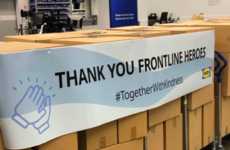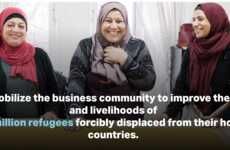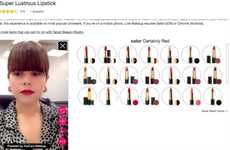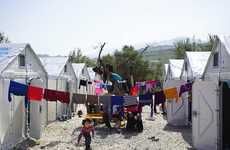
IKEA Will Soon Be Offering Employment Opportunities for Refugees
Mishal Omar — April 19, 2017 — Art & Design
References: jordanriver.jo & dezeen
The multinational corporation IKEA is increasingly known for its commitment to helping those in need, and its latest venture will take the form of production centers in refugee camps.
The company will be opening these production centers in Jordan this coming summer, and "will employ a mixture of Syrian refugees and local Jordanian workers in the production of woven products including rugs, cushions and bedspreads." The company will build and equip the center itself, and will begin by employing 100 people – a number which will eventually rise to 400.
This particular initiative will be taking place in collaboration with the Jordan River Foundation, and the company aims to employ an additional 200,000 people through similar initiatives around the world in the next 10-15 years.
The company will be opening these production centers in Jordan this coming summer, and "will employ a mixture of Syrian refugees and local Jordanian workers in the production of woven products including rugs, cushions and bedspreads." The company will build and equip the center itself, and will begin by employing 100 people – a number which will eventually rise to 400.
This particular initiative will be taking place in collaboration with the Jordan River Foundation, and the company aims to employ an additional 200,000 people through similar initiatives around the world in the next 10-15 years.
Trend Themes
1. Refugee Employment - IKEA's production centers in refugee camps offer employment opportunities for refugees, showcasing the rising trend of companies supporting social empowerment.
2. Humanitarian Entrepreneurship - IKEA's collaboration with the Jordan River Foundation highlights the trend of businesses partnering with non-profit organizations to drive positive change in refugee communities.
3. Sustainable Handcrafted Products - With the production of woven products such as rugs, cushions, and bedspreads, IKEA taps into the trend of sustainable and handmade home goods.
Industry Implications
1. Retail - Retail companies have the opportunity to support social causes and create employment opportunities for refugees through the establishment of production centers in collaboration with local organizations and communities.
2. Nonprofit - Nonprofit organizations can partner with businesses to leverage their expertise and resources to empower and create better livelihoods for refugees through employment initiatives.
3. Textile and Home Goods - The textile and home goods industry can embrace the trend of sustainability and handmade products by collaborating with refugee communities to create unique and socially impactful products.
4.9
Score
Popularity
Activity
Freshness























